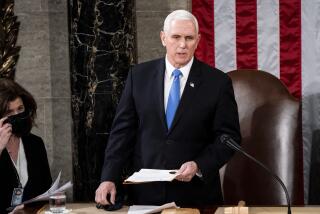Reynolds Sees Rare Case for Lifting Privilege
- Share via
WASHINGTON — Assistant Atty. Gen. William Bradford Reynolds, who first unearthed evidence that funds in the Iran arms deal had been diverted to anti-Sandinista Nicaraguan forces, suggested Saturday that the Iran controversy may be a rare case serious enough for an Administration to waive its right of executive privilege and release internal Administration documents to Congress.
In a speech to the Federalist Society, a group of mostly conservative lawyers, Reynolds argued primarily that the executive branch has been too lax in asserting its constitutional powers and responsibilities, and ought to invoke executive privilege more often to defend confidentiality.
But, he conceded: “At times, there may well be valid reasons to waive the privilege; the current Iranian controversy suggests itself as one such situation.”
Part of Investigative Team
Reynolds, who heads the Justice Department’s civil rights division and is a combative champion of Reagan policies, was one of a special group assigned by Atty. Gen. Edwin Meese III to investigate the then-fledgling Iran scandal late last November.
During that hurried investigation, Reynolds uncovered a key document in Lt. Col. Oliver L. North’s National Security Council files that spelled out the plan to divert some of the Iran arms money to a Swiss bank account earmarked for aiding the Nicaraguan contras. Meese publicly disclosed the covert diversion of funds and named North as its chief instigator on Nov. 25--the date from which the Iran-contras issue became a full-time Washington obsession.
Explaining his main point in his prepared remarks to the lawyers’ group, Reynolds said: “While executive privilege is not spelled out in the Constitution, the Supreme Court has recognized unequivocally what common sense would suggest: namely, that in order to fulfill their responsibilities under the Constitution, the three branches have to be able to deliberate internally . . . and that such deliberation is chilled when those who give advice must constantly wonder what partisan opponents will think of the advice two, five or 10 years from now.”
The solution, Reynolds said, is for the executive branch to insist on the confidentiality of the internal papers it generates much more vigorously than it now does--and for Congress to respect that claim.
Calls for Assessing Impact
“Yet, faced with requests from Congress for executive documents,” he said, “too often we turn them over without sufficient consideration of the ways in which, over the long haul, we might be undermining the capacity of this branch of government to conduct its business in a proper fashion.”
“More often than not, the question of disclosure comes down to nothing more than a disappointing trade-off between, on the one hand, standing up for our constitutional rights and responsibilities and taking the heat for doing so from Congress, and, on the other hand, abandoning those rights and responsibilities for the sake of some more immediate political advantage. Sadly, the political side of the equation invariably trumps constitutional considerations.”
Sees Ineffectiveness
The consequences of such a choice, Reynolds said, add up to less effective government. “There are now subtle differences between what government officials are willing to commit to paper and what they insist on stating to you face-to-face--and understandably so,” he said.
“People are concerned that every word they write down is a potential weapon in the hands of a political opponent; no one can be sure what might be turned over in the future, and how it might read when taken out of its deliberative context. As a result, each time the executive branch declines to exercise its constitutional privilege . . . the effect on decision-making is dramatically inhibiting.”
More to Read
Get the L.A. Times Politics newsletter
Deeply reported insights into legislation, politics and policy from Sacramento, Washington and beyond. In your inbox twice per week.
You may occasionally receive promotional content from the Los Angeles Times.










